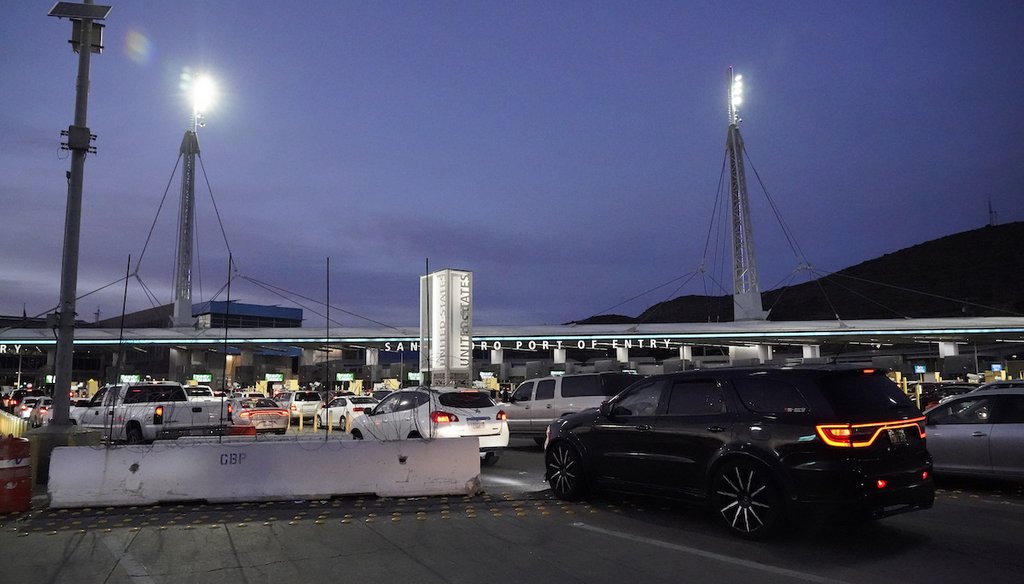Stand up for the facts!
Our only agenda is to publish the truth so you can be an informed participant in democracy.
We need your help.
I would like to contribute

Cars pass barriers at the entrance to the San Ysidro Port of Entry between Tijuana, Mexico, and San Diego, March 2, 2022. (AP)
If Your Time is short
-
The man accused of attacking House Speaker Nancy Pelosi’s husband entered the U.S. in 2008 and overstayed the six-month limit granted to Canadian visitors.
-
Canadian citizens do not need a visa to enter the United States, but they can’t stay in the country for unlimited periods of time.
-
Immigration and Customs Enforcement asked the San Francisco County Jail to notify the agency before David DePape is released from their custody, so ICE can take him into custody and eventually deport him.
The man accused of attacking House Speaker Nancy Pelosi’s husband has been in the U.S. illegally since 2008, U.S. Customs and Border Protection told PolitiFact.
On Nov. 1, U.S. Immigration and Customs Enforcement — the agency in charge of deportations — asked the San Francisco County Jail to notify it before David DePape is released from their custody so that ICE can take him into its custody and eventually deport him.
DePape, a Canadian citizen, entered the U.S. as a temporary visitor through an official point of entry at the U.S.-Mexico border. DePape overstayed the six-month limit Canadian citizens are typically granted when they enter the U.S. He was arrested and charged with attempted murder and multiple other charges after authorities said he broke into the Pelosi’s San Francisco home Oct. 28 and attacked Paul Pelosi.
DePape’s case left us wondering about the immigration rules that apply to Canadians who come into the United States without a visa. Here’s what we found.
Canadians don’t need a visa if they come for six months as visitors
Barring limited exceptions, Canadian citizens and lawful permanent residents do not need visas to visit the U.S.
Canadians who wish to travel to the U.S. by plane must have a valid passport or a NEXUS card, a program that pre-screens travelers entering the U.S. or Canada. Canadians traveling by land or sea can show either of these or a Secure Electronic Network for Travelers Rapid Inspection card.
As of Oct. 1, Canadian citizens entering the U.S. by land must also receive authorization through the Electronic System for Travel Authorization, which screens passengers for possible law enforcement or security risks and is valid for two-year periods. DePape entered the U.S. in March 2008 through the San Ysidro land border between Tijuana, Mexico, and San Diego.
Although DePape is Canadian and did not need a visa when he first entered the U.S., CBP told PolitiFact he was in the U.S. as a temporary visitor classified under the "B-2" visa category for tourists.
Canadians cannot stay in the U.S. indefinitely as visitors
Canadian citizens who enter the U.S. as visitors can usually stay for up to six months. (Visitors from countries in the visa waiver program are usually allowed to stay in the U.S. for up to 90 days.)
There is no set period of time that Canadians have to wait before re-entering the U.S. after the initial six-month period. However, they must prove to CBP officers that they are not using this as a strategy to live in the U.S. This can be done by showing proof of employment or residency in Canada.
If Canadian citizens want to stay in the U.S. for an extended period, they would need to apply for the appropriate visa.
A common misconception is that all who are in the U.S. illegally entered the country by crossing through the southern border. A 2018 study from the nonpartisan think tank Center for Migration Studies, found that from 2010 to 2018 about two-thirds of new immigrants in the U.S. overstayed temporary visas; one-third crossed the border illegally.
People who overstay a temporary visit permit can be deported
If people stay in the U.S. past their allotted time frame, they are considered to be accruing "unlawful presence" each day since their expected departure. The more "unlawful presence" time accrued, the longer they’re inadmissible in the U.S.
For example, if you accrue more than 180 days but less than a year in one stay, and you left the U.S. before the Department of Homeland Security started removal proceedings against you, you can’t legally enter the U.S. again for three years.
If you accrue more than a year, or were deported from the U.S., you can’t legally return for 10 years.
ICE can deport any immigrant illegally in the country who commits crimes, threatens public safety or violates visa requirements.
"ICE prioritizes noncitizens with criminal convictions for removal regardless of whether they overstayed a visa or entered the country illegally," Michelle Mittelstadt, communications director at the nonpartisan Migration Policy Institute told PolitiFact.
DePape has been charged with multiple crimes including assault, attempted murder and attempted kidnapping.
RELATED: Misinformation fuels false narratives about attack on Paul Pelosi
Our Sources
Email exchange, Michelle Mittelstadt, director of communications at the Migration Policy Institute, Nov. 4, 2022
Email exchange, Department of Homeland Security, Nov. 3, 2022
U.S. Customs and Border Protection, email exchange, Nov. 3, 2022
U.S. State Department, Visa Waiver Program, accessed Nov. 4, 2022
U.S. Customs and Border Protection, Visa Waiver Program, accessed Nov. 4, 2022
U.S. Customs and Border Protection, Visiting the U.S. - Documents required for Canadian Citizens / Residents / Landed Immigrant to enter the U.S. and how long they can stay, Oct. 25, 2022
U.S. State Department, Visitor Visa, accessed Nov. 4, 2022
U.S. Citizenship and Immigration Services, Extend Your Stay, accessed Nov. 4, 2022
U.S. Citizenship and Immigration Services, Change My Nonimmigrant Status, accessed Nov. 4, 2022
U.S. Citizenship and Immigration Services, Unlawful Presence and Inadmissibility, accessed Nov. 4, 2022
USA Gov, Deportation, accessed Nov. 4, 2022


































